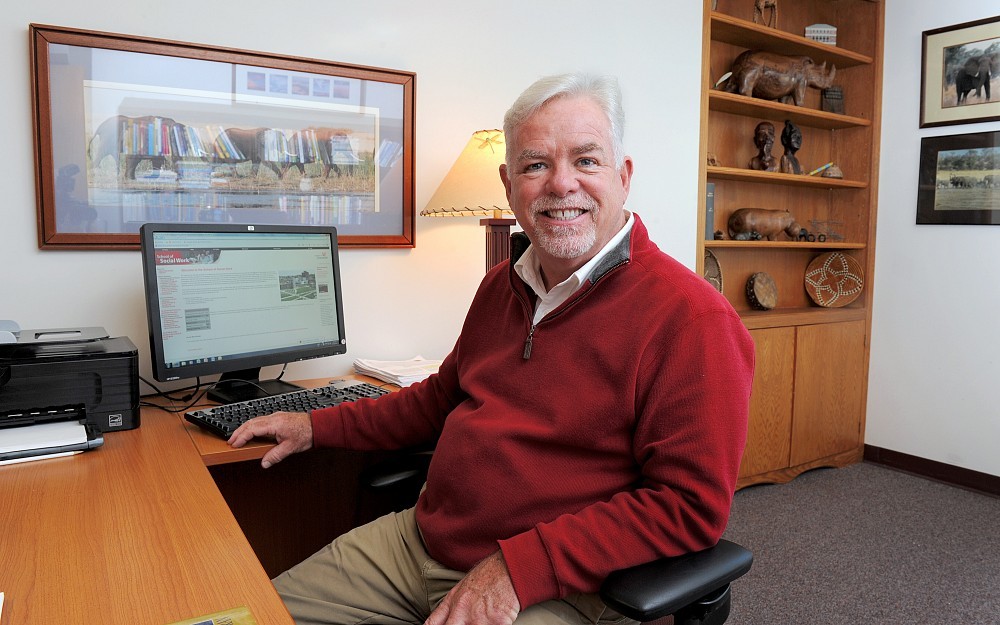
Social Work Professor Focuses on Veteran Population in New Book
This Veterans Day, associate professor of social work Gary Dick, PhD, is focusing on preparing social workers to better serve the need of the millions of veterans and military families across the country.
Dicks new textbook, Social Work Practice with Veterans, has just gone to production, with an anticipated release date in early 2014.
He hopes the text will contribute to a larger trend in social work across the country, as more undergraduate and masters level programs offer concentrations in social work practice with veterans, and the job field continues to grow.
The U.S. Labor Department predicts a 25 percent increase in jobs for social workers between 2010 and 2020, and the National Association of Social Worker (NASW) predicts the biggest populations for social workers in the future will be veterans, military families, and the aging population.
Dick, a faculty member in UC's College of Allied Health Sciences, says the book first takes a historical approach towards Americas military conflicts.
"We study each war in the history of America, what were the causes behind them and how the service members were treated, he says. "Additionally, I felt it was important to help social workers take a look at recent conflicts especially within the current social and historical contextthey are different than other conflicts in our history.
The main text covers two topics in social work practice with veterans: "Stressful Transitions and "Complicated Adjustments.
In "Stressful Transitions, Dick and coauthors outlines the deployment process and its impact on service members and their families. The section also address theoretical perspectives on what motivates individuals to serve in the military.
In "Complicated Adjustments, they explore the multistage process of returning from deployment, including the transition from the tight bonds of a military unit and its sense of purpose to fitting back in with civilian society and searching for employment. The text also covers what can happen when adjustment does not go well: post-traumatic stress disorder, substance abuse, homelessness, incarceration and suicide.
Dicks research focus into fatherhood and parenting also contributed to the text, as he added a focus on what happens to parents and their relationship with their children once they go oversea.
"Service members who go on multiple deployments can miss out on significant part of their childrens growth, he says, "They may come back and want to pick up where they left offbut their child isnt 12 anymore, they are 15.
The text also includes a section on gays and lesbians in the military, including the history of their service, the law "Dont Ask, Dont Tell, and its recent repeal.
Dick says that writing process was a lesson in revision: "While we were writing that chapter, the entire culture changed.
He edited the book and wrote portions alongside collaborators from other universities and local health care providers, including the Cincinnati Department of Veterans Affairs Medical Center. Seven alumni from the UC School of Social Work contributed chapters, based on their experience working with veteran clients in the field.
Dick also has a personal interest in studying veteran well-being. Starting from the Revolutionary War, when his ancestor John Dick served as a scout (and later Sergeant) and was briefly captured by the British, hes had at least one family member serve in every American conflict since.
"At one time, during World War II, my grandmother had four children all serving in the war effort, three boys and one girl, he says.
Related Stories
Increasing syphilis cases highlight treatment barriers across...
May 14, 2024
The University of Cincinnati's Carl Fichtenbaum spoke with the Cincinnati Enquirer about a recent report that found Hamilton County syphilis cases reached a six-year high in 2023.
A look inside The Culture Corner
May 14, 2024
Designed and curated by students, The Culture Corner is a safe space inside the Health Sciences Building where students can discuss identity, learn about other cultures and be their authentic selves.
Local 12: Brothers donate organs to their mother
May 13, 2024
Local 12 highlighted the story of Lynnette Knott, who received organ donations from sons Mark and Matt performed by University of Cincinnati physicians.
